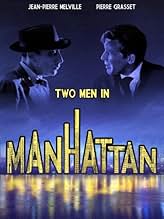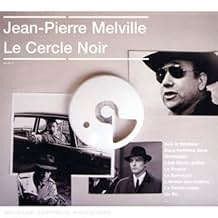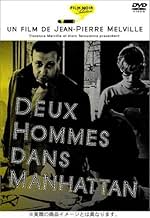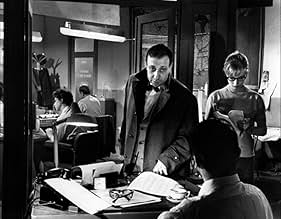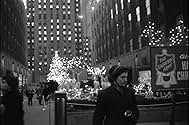Deux hommes dans Manhattan
- 1959
- Tous publics
- 1h 24m
A French UN delegate has disappeared into thin air, sending reporter Moreau and hard drinking photographer Delmas on an assignment to find him. Their only lead is a picture of three women.A French UN delegate has disappeared into thin air, sending reporter Moreau and hard drinking photographer Delmas on an assignment to find him. Their only lead is a picture of three women.A French UN delegate has disappeared into thin air, sending reporter Moreau and hard drinking photographer Delmas on an assignment to find him. Their only lead is a picture of three women.
- Director
- Writer
- Stars
- Bessie Reed
- (as Michele Bailly)
- Director
- Writer
- All cast & crew
- Production, box office & more at IMDbPro
Featured reviews
A French UN delegate goes missing in New York City, and a French reporter (played by Melville himself) and his photographer friend go on the hunt by tracking down three women, one of whom is suspected to be his mistress.
I love a good mystery, especially one shot on location in late-50's New York, and the "over the course of a single night" conceit can be delightful. But the characters initially read flat, and the stakes feel nonexistent until we get towards the end of the story. Once certain characters' true colors are revealed, it becomes a treatise on the moral responsibility of journalists and storytellers, and, Melville being Melville, French WWII resistance comes into play. It's not terribly nuanced, but it's an effective moral tale, revealing the same sort of deep humanism that underlies Army of Shadows.
Visually, it's a strange, inconsistent blend. Much feels amateurish, like a quickly-shot newsreel, which isn't inconsistent with the sorts of noir and noir-tinged 40's and 50's American urban films Melville is riffing on (The Naked City looms particularly large). But it doesn't feel quite in the wheelhouse a director whose use of meticulous, almost meditative cinematography is a distinct calling card.
That said, there are some incredible shots, including a slow tracking shot in a jazz studio, which is now near the top of my "scenes featuring musical performances where it's clear they're actually playing the music" list.
Overall, it's a less essential entry in the Jean-Pierre Melville catalog. But if you've watched the big ones, and want to see a great director directing himself in a good movie, check it out.
Eventually they locate the man and then comes an important decision- -what to do with this information. The photographer, naturally, wants to make the most of it and spread sensationalistic photos everywhere. The other guy is decent and tries to get his new partner to do the right thing.
I love the films of Jean-Pierre Melville--at least up until this one. It's not a terrible film but nothing like the great film noir features Melville made (mostly in the 60s and 70s). But it did have a homemade feel--cheap and definitely more French New Wave than his usual more polished work. Lots of cheap stock footage of New York was used and so many of the English-speaking actors sounded anything but like New Yorkers. French audiences probably wouldn't have recognized this, but to an American the accents often don't fit or sometimes sound like foreigners TRYING to sound American...and failing. Mildly interesting and clearly the last portion is by far the most interesting. Plus, being a French film it has some nudity, lesbianism and other plot elements you just wouldn't have found in an American film of the time.
If you are looking for a noir with verve and great music, why not try Ascenseur pour l'echafaud, with REAL actors and Miles Davis's great score.
'Deux Hommes' is generally considered one of Melville's least successful films, and the director rejects it in his famous interviews with Rui Nogeuira, claiming that its failure made him seriously rethink his way of making films. It's not easy to see why it should be so disapproved of. The narrative is brisk if conventional, as it follows a traditional detective story route of problem, investigation, solution. Perhaps what is most objectionable is the film's theme, the idea that sometimes it is honourable and proper to conceal the truth from the public.
I may be biased - this was my first Melville film, eight years ago, beginning a love affair that is even more intense today - but I think 'Deux Hommes' is pretty good, for a number of reasons. Most immediate is Melville's use of light and darkness, the way he works between blazing neon and dense obscurity, as he does between noise and silence or sharp montage and Wyler-like deep-focused long-takes. This visualises the theme of the film, the darkness of the 'victim''s absence brought to light by the investigative journalists, with truth thrown back into the darkness.
Although Melville's heroes seem less 'deconstructed' here than in his most famous films, he uses subtly elaborate means to undermine them. Throughout, they are in a position of power, moving with ease through the different worlds of New York, from burlesque houses and brothels to expensive bourgeois apartments, linking two seemingly disparate realms. When interviewing people who knew Fevre-Berthier, Moreau remains rigidly framed, while his interlocutors are shot from different angles, cut up, fragmented, figuring his unbreakable integrity, and their dissimulating multiple identities.
But Moreau, for all his supposed decency, is never as powerful as he thinks. His firm point of view is often broken up by unmotivated angles that problematise scenes he dominates. He is frequently swallowed up in darkness, his authority literally disappearing. God-like camera angles looking down on him mirror the car that follows him - unlike a conventional detective, he has less information than we do, and so is emasculated. His body is sometimes broken up by Melville's compositions, particularly when the pair come out of Capitol Studios, and are shot from inside a car, watched by an unseen stranger, or in the climactic chase, as he keeps getting out and back into the car, his head repeatedly lopped off.
this undermining is linked to the theatrical metaphors strewn throughout. The four women interviewed are all linked to performance - an actress, a singer, a call-girl pretending to be Marilyn Monroe, and a stripper. Dalmas mimics Fevre-Berthier, and invents a different death for the victim, just as Moreau and his boss finally do. The men play the role of brother and friend to sneak into the hospital. They repeatedly enact what they're going to do or see. Throughout the film we get shots of the surface of New York, as if nothing has changed, but once we have penetrated the world beneath the glitter, it is impossible to take these signs, or these men, in the same way again.
Unusually for a Melville 'crime' film, the protagonists are detectives and not gangsters. However, Melville uses similar tropes to his gangster films to further undermine his heroes. The hospital scene is familiar from these films, the shaking up of someone with information, Moreau waiting outside like a boss, while his henchman does the dirty work. Moreau, throughout the sequence, with his 'gentle' persuasiveness, becomes genuinely sinister.
As they wait with the corpse in his lover's apartment, Moreau and Dalmas are visited by the editor, the 'Boss', wearing shades - his dealing with the body, his wearing shades indoors, his re-arrangement of the truth are all gangster staples, and yet he is the editor of a reputable magazine, determined to bury the truth about a Churchill-praised Resistance hero.
Melville is often acclaimed/reviled as France's greatest Americophile. It is here significant that Melville the director is also the lead actor, because just as the actor goes through a real geographical space, the director goes through an imagined cultural space of favoured American landmarks, Time Square, Broadway, Mercury Theatre, Time Magazine, Capitol Studios etc. The anti-hero's name is Delmas, a reference perhaps to John Dalmas, Chandler's prototype Philip Marlowe.
This kind of allusionism further destabilises the film's realism, as do narratively irrelevant shots of cigarette packets, the brand smoked by Melville's one-time friend Godard. Melville is always pushing back the limits of his genre, the hilarious, 'A Bout de Souffle'-like jazz-warnings to remind us of the car following our heroes, the car-lights seem to wink at us, as if we're both in on the joke on the heroes. In a very striking scene, flagrantly breaking 'plausibility', Moreau gets into the driver's seat with the address card of their next destination. The soundtrack suggests they start up and drive off, but the camera stays in an immovable car on the driver holding the card. In the penultimate scene, as Delmas lays slumped on the floor, the band that had been the act become the audience; a trumpeter approaches and blows with mock-melancholy.
There is so much more in this deceptive, short film that deserves a reconsideration, especially for its incredibly detailed technique that never forces itself, but is very rich. But the film works best for me as a (Hustonian?) study in failure, of the film's other hapless womaniser, Delmas, a great talent doused in impotence and drink, prepared to do vicious things for a break, a man who could have had everything, but seems shell-shocked by life, who can only find beatitude through alcohol. Rather him than the deeply creepy probity of his partner.
Finally, about a quarter hour in, Melville goes to the apartment of his cameraman, Pierre Grasset, and the wallpaper outside his apartment was poorly hung. Aha! I thought, a creature of the demi-monde, someone who cuts corners, was looking out for himself, who had pictures of the young women that the diplomat.... associated with. Off they went into the night, still followed by a mysterious trailer: Melville, the moral reporter, and Grasset, the corrupt guide. I knew they would find their prey; but how moral would Melville be and how corrupt Grasset? And who was following them and why? Who was the hero of this story and exactly what was the Great White Whale they were following?
This movie is Melville's own personal fantasy, set in a fantasy New York glamorous beyond belief to anyone who has dwelt in the real one. He had been born Jean-Pierre Grumbach, and had adopted a new surname in admiration of Herman Melville. He had played Bartleby and written and directed his own movies and now was going on his own voyage to find out if he could be the hero of his own tale.
Did you know
- TriviaThe first credited acting part for director Jean-Pierre Melville.
- Quotes
The Singer: [sings] There's a street in Manhattan / With a house that has no windowpanes / And the lamp that burned all night / Listen man, go away from me / I lived there so long ago / With a guy you wouldn't care to know / God it's cold here / Nothing good here / Go man / Not tonight
- ConnectionsFeatured in Keeping Up Appearances (2013)
- How long is Two Men in Manhattan?Powered by Alexa
Details
- Release date
- Country of origin
- Languages
- Also known as
- 2 hommes dans Manhattan
- Filming locations
- New York City, New York, USA(Exterior)
- Production companies
- See more company credits at IMDbPro
Box office
- Gross worldwide
- $2,527
- Runtime1 hour 24 minutes
- Color
- Sound mix
- Aspect ratio
- 1.37 : 1
Contribute to this page



